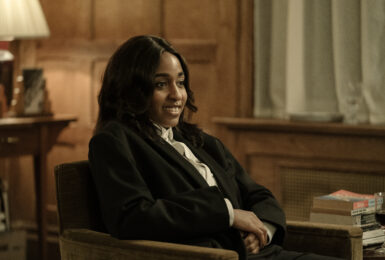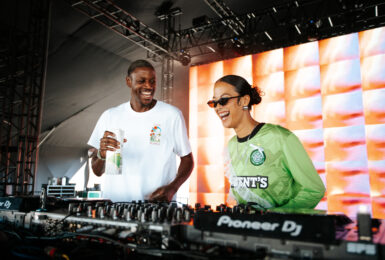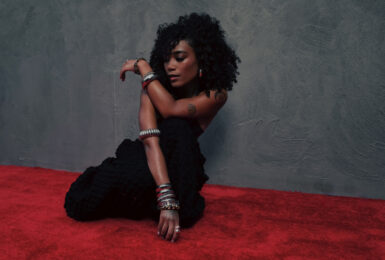Music
afropunk interview: macy gray
Macy Gray is fearless. Sprawled on a chaise lounge in a Times Square hotel suite, awake since 4AM (thanks to a Good Morning America appearance), the 51-year-old singer-songwriter promotes her 10th album, Ruby, suffering fools (and writers) gladly. Just four years ago, Gray used her incomparable raspy voice to tell Oprah Winfrey about a former addiction to hash and ecstasy that went hand-in-hand with the downward spiral of her album sales, after 1999’s On How Life Is. But that’s not the bravery in question. What makes her fearless is that she perseveres.
Many neo-soul/alternative/non-traditional-genre singers who debuted at the turn of the millennium retrenched once iTunes trumped physical record stores. But Macy Gray continued, through jazz albums (Stripped), cover albums (a remake of Stevie’s Talking Book) and albums where she played Vanity to will.i.am’s Prince (Big). Ruby continues to prove the virtue of enduring; the Trump age needs contrarian anthems like the album highlight “White Man” to balance these Bizarro World times. Macy Gray promises to stick around like a classic aging crooner, and we’re all here for it.
In 2012, you covered a classic Stevie Wonder album track for track, choosing it out of all his classic albums. Ruby is your 10th album in almost two decades. Which do you consider your own classics?
My first one [On How Life Is], for sure. My second one [2001’s The Id]. And then — what else? This one. I’m trying to remember all my albums. [laughter] I think all the ones in between were great, but I really liked Stripped, my jazz album.
At 76, Paul McCartney just scored a number one album. In terms of longevity, how long do you expect to make music?
I’m probably gonna do an Ella [Fitzgerald]. Singing when I’m 80 and stuff. Making records. I just love making records. That’s life. It just makes me happy.
Put the success of your Grammy-winning classic “I Try” into perspective. Do you still open royalty checks from airplay that let you continue to do what you do?
It kind of paid for everything, for a long time. [laughter] Honestly, I couldn’t call it. To this day, you can ask anybody who knows me personally, I don’t know what happened. I was arguing with my label about what song to put out because I didn’t think “I Try” was a big hit or nothing. Even [“Over You”], the single that’s out now and doing well, that’s the one I didn’t like on this album. It’s the one I liked the least. [The record company] just did it: “Oh yeah, don’t worry about it.” [laughter]
But after “I Try” hit, it was surprising. Of course I was lovin’ it. Every day I wake up and go on my Instagram, and there’s at least 10 people covering it just that day. It’s a huge karaoke song. And even today, no matter where I play it, everybody still knows all the words. Everybody still screams when I play it, so… I really don’t understand it. I have no idea what I did right.
One of the highlights on Ruby is “Just Like Jenny.” Who’s Jenny?
From Forrest Gump! [laughter] I would’ve missed it if I didn’t know. I just remember seeing it and she was just kinda like this wild girl and totally free. She had the heart to be best friends with this disabled, nerdy kid and she was pretty. I don’t know. She was just kinda like this girl who just lived. You know how people say, “go live”? She kinda represented that. I liked her.
You have a song called “White Man” on the album too. Say something about this surreal white supremacist political moment.
I think just trolling and being honest got way too popular. I think it was better when everybody just pretended it was all good and that we all liked each other. I just think everybody got too comfortable with putting other people down and telling other people the truth and stuff like that, you know what I mean? I don’t think the way people feel has changed. I really don’t think it will as long as people are different. And I tell people: there’s no bigger racists than Black people. We talk about people worse than anybody, in private. But now everybody wanna be open about how they feel about everything. And it’s healthy, I guess, if you wanna get things out. But it’s also chaos, you know? A lot of things are meant to be kept to yourself, that’s all.
Talk a little bit about the recording of Ruby.
The vision was Nina Simone 2020. I don’t think we did that. But we had a vision, so it kinda set the standard and set the moment for the record, what we were going for. And then after that, a lot of things fell into place. I got the greatest writers and producers in music and musicians. I think the fact that we had that vision, everybody went for the big deal, and we came up with songs like “White Man.” I think we wrote “Just Like Jenny” second. And then after that, songs just got bigger and bigger.
Who are the collaborators and how did you find them?
So it all started when I went to this lady by the name of Wendy Goldstein. She’s a big A&R chick, she was A&R at Republic Records. And she was A&R’ing Ariana Grande’s last record [Dangerous Woman]. I went to see her about signing to Republic; and she didn’t sign me, but she said, “You would be perfect for this new Ariana record.”
She got on the phone, and called the producer. She gave me the time to go over to his house and it all happened within five minutes. I went over there that night and the producer happened to be Tommy Brown, who led one of the two production teams that did my record. So I did the Ariana spot [“Leave Me Lonely”] and we really clicked, and then he was like, “Yeah, come back tomorrow and let’s see what we can come up with.” I went back the next day and we ended up working off and on for a year and a half. He’s a really good friend of mine too. Love him.
And the other production team?
The other one was Johan Carlsson. He’s [pop mega-producer] Max Martin’s right-hand man, like his main guy. That’s a boring story. My manager’s girlfriend ran into Johan Carlsson’s wife somehow, I don’t even remember. And then they were talking. “My husband is a producer.” “Oh, mine’s a manager.” They talked and then she told her he represents me and “Oh, I’d love to work with her.” It was crazy because I was on my own, no deal, no nothing. Nothing big to offer in exchange. I just got super blessed, you know? They didn’t give me their shitty tracks that were all left over that people didn’t want. Everybody went in and did their best shots, so I’m cool. It was awesome.
You’ve got three kids. How’s that going?
They’re doing good: 23, 23 and 21. Awesome people. I don’t know what they’re gonna do, but I’ll be glad when they get out of my house. [laughter] But I like ’em! I like ’em a lot. They’ll figure it out. My son’s actually a really good writer. He wrote on a song called “Shenanigins.” He plays. He’s super cool. He’s going on tour with me. He’s gonna sell merch for me — he’s a talker. He could talk you into anything. So he’s gonna do my merch and then I’m actually gonna drag all three of my kids on tour with me this year. Shoot me. What am I doing? Stop me. [laughter]
On Oprah: Where Are They Now, you spoke a little about being ill prepared for the success of your first album. Is that still your perspective?
I don’t know if I was unprepared. You don’t really know what it’s like until you have it. It’s not really unprepared, it’s just an art like anything else that you have to navigate. Fame and money and stuff. So I think if you’re new to that, you’re gonna have ups and downs and there’s gonna be things you don’t understand. There’s gonna be mistakes you make and stuff like that. Somebody like Justin Timberlake, he started out when he was eight. Or Michael Jackson. By the time they’re in their 20s, they know what they’re doing. I started in my late 20s, so I had all these peaks and valleys for a really long time. And then I finally figured it out.
Get The Latest
Signup for the AFROPUNK newsletter




